« August 2006 | HOME PAGE | October 2006 »
September 26, 2006
Off to Everest
Have you heard the one about the Slovak, the American, the Japanese, and the Englishman heading in a jeep to Mt. Everest? Neither have I. But this joke will be my life over the next five days as I make a round-trip journey from here in Lhasa down to base camp at the highest mountain in the world. I'll be sure to post a ton of photos when I get back to Xinjiang, but for now here's a night-shot self-portrait I snapped in front of the Potala Palace this week. It really is a damn impressive building:
Also, I wanted to let everyone know that the voting over at the Asia Blog Awards for "Best China Blog" has begun. Please vote for this site, as mine is obviously the finest blog in the Middle Kingdom.
I'll be back in five days!
posted September 26, 2006 at 07:59 AM unofficial Xinjiang time | Comments (23)
September 20, 2006
Lhasa by Rail
Well, I've finally arrived here in Lhasa, having caught the train from Golmud early this morning. In the end, it took exactly four days and four hours to make the journey from Korla... pretty much what I'd expected. I'll describe things in more detail when I'm not so busy traveling, but in the meantime I thought I'd upload a couple more video clips so that you can get a feel for the recently opened rail route to Tibet, the so-called "Lhasa Express". The first clip was shot just after sunrise while passing through the Kekexili Nature Reserve in Qinghai. The second clip was shot later in the day, when I was still about an hour away from reaching Lhasa:
NOTE: Please turn down the volume on your computer before playing these clips, unless you enjoy the sound of wind battering a small microphone.
Oh, yeah... for those of you who were wondering about a previously mentioned plan of mine, I did not end up paying for a f%^@$* Tibet Travel Permit. Take that, CITS! My devious ways ended up saving me more than Y1200 ($150) and they can save you, too. More on that later.
posted September 20, 2006 at 08:09 PM unofficial Xinjiang time | Comments (14)
September 18, 2006
Qarkilik Uyghur Dance Party
Greetings from Huatugou (花土沟), Qinghai Province, about 70 km east of the border with Xinjiang! I traveled six hours from Korla to Qarkilik (Ruoqiang) by bus on Saturday, and then seven hours from Qarkilik to Shimiankuang (石棉矿 aka Asbestosville) followed by an additional hour here to Huatugou on Sunday. I've teamed up with a Japanese man I met in Qarkilik named Kazuya, and we're currently waiting for the bus to Golmud (Ge'ermu; 格尔木), which should take somewhere in the neighborhood of 15 hours... give or take a few.
Anyway, the point of this entry is to share with you a wonderful experience I had in Qarkilik on Saturday evening. I arrived there just as the Loulan Date Cultural Festival (Hongzao Jie) was wrapping up, and was able to participate in a wonderful maxirap. A maxirap (pronounced mesh-RAP) is a traditional Uyghur dance party, complete with a band of rawap, dutar, and suona players and lots of lively dancing. You can see below for yourself in the two short clips I shot on my camera.
The first clip is an introduction, giving you a glimpse of the band and the dance floor surrounded by hundreds of onlookers:
The second clip features more Uyghur dancing. Check out the beautiful Uyghur woman in the foreground, who's head is occasionally cut out of the shot. About ten minutes after I shot this video, I was out in the crowd dancing with her! (I'm not a bad Uyghur dancer... at least by the standards set for foreigners.) Va va voom!:
Ah, what fun it is to dance the night away...
posted September 18, 2006 at 10:35 AM unofficial Xinjiang time | Comments (23)
September 16, 2006
The Other Opposite End of China
 The Opposite End of China is heading south, down to that other autonomous region, the one with all the colorful oversized robes, sunburnt cheeks, and globally-respected spiritual leaders. Fodor's has asked me to head down to Tibet (Xizang; 西藏自治区) as soon as possible to cover for one of their writers who has gone missing-in-action.
The Opposite End of China is heading south, down to that other autonomous region, the one with all the colorful oversized robes, sunburnt cheeks, and globally-respected spiritual leaders. Fodor's has asked me to head down to Tibet (Xizang; 西藏自治区) as soon as possible to cover for one of their writers who has gone missing-in-action.
I'll be leaving in just a few hours... yet despite Xinjiang's proximity to Tibet, the journey will likely end up taking me longer than if I was leaving from, say, Beijing or Shanghai. The reason? I'll be traveling via the seldom-used Xinjiang/Qinghai backdoor route between Qarkilik (Ruoqiang; 若羌) and Golmud (Ge'ermu; 格尔木). It's not clear how long the passage over that awful road will take, although I've been told I'll need to stop in a place known as Yiqimubulake on the Xinjiang/Qinghai border. I've never heard of it (is it also known as Tomorlog?), nor can I find a place that exactly matches that name on the map. Oh, well.
So, here's the route I'll be taking from Korla (Kuerle; 库尔勒) to Lhasa (Lasa; 拉萨), and then on to Everest Base Camp (which I assume will be my farthest destination):
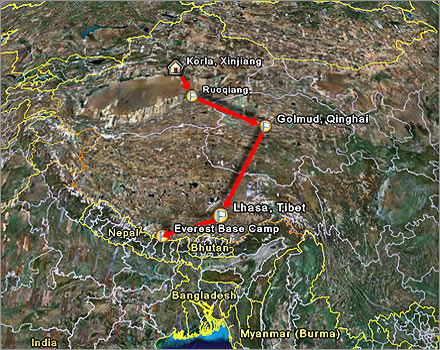
Since I'll be on the road for about three weeks, don't expect the blog to be updated very regularly in the near future. I'll try to throw up a nice photo or a description of my location when I get the chance, but I'm not making any promises. Wish me luck. Onward!
posted September 16, 2006 at 07:55 AM unofficial Xinjiang time | Comments (21)
September 15, 2006
Hu's Inspection Tour
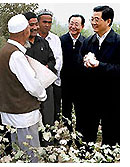 Some of you may have heard that Chinese President Hu Jintao recently completed a five day inspection tour of Xinjiang. The strange thing is, I don't think anyone heard about the tour while it was taking place from September 6 to September 11. Why the secrecy? I suppose it was to protect Hu from all the Uyghur terrorist assassins lurking in every back alley and bazaar... you never can be too careful, you know! I myself only found out about the visit through a description of a special report that was broadcast on CCTV-1:
Some of you may have heard that Chinese President Hu Jintao recently completed a five day inspection tour of Xinjiang. The strange thing is, I don't think anyone heard about the tour while it was taking place from September 6 to September 11. Why the secrecy? I suppose it was to protect Hu from all the Uyghur terrorist assassins lurking in every back alley and bazaar... you never can be too careful, you know! I myself only found out about the visit through a description of a special report that was broadcast on CCTV-1:
After a brief introduction to Xinjiang, described as "land of hope," the narrator went on to give an account of Hu Jintao's inspection tour...."From southern Xinjiang to northern Xinjiang, from the countryside to urban areas, from the Gobi desert to oasis, the general secretary endured the hardships of a long journey and immersed himself in enterprises, villages, schools, local communities, military barracks, and the Xinjiang Production and Construction Corps, where he visited and extended greetings to people of different ethnic groups and conducted investigation and study on promoting economic and social development, and improving the livelihood of the various ethnic groups."
Man, what a great guy! Who would expect the president of China to "endure the hardships of a long journey" to visit lil' ol' Xinjiang? (It's not like it's the largest province - err, autonomous region - in China or anything.) I'm definitely gonna vote for this guy in the next election.
A more detailed account of Hu's visit to Xinjiang - a translation of which reached me as usual via the BBC Monitoring Service - was published by Xinhua, the official Chinese news agency:
[Hu Jintao] emphasized that it is necessary to comprehensively implement the scientific development concept, firmly seize the valuable opportunity of the implementation of the strategy of the general development of the western region by the state, make great efforts to promote the economic and social development of areas inhabited by minority ethnic groups, earnestly improve the living standard of the people of various ethnic groups, and constantly open up a new horizon of unity, stability and vigorous development of areas inhabited by minority ethnic groups.
Hu Jintao pointed out that it is necessary to persistently take the road of a new type of industrialization, make greater efforts to readjust the economic structure, endeavour to increase the ability to make innovation on our own, cultivate industries with special characteristics and make them strong, raise the technological level of industries and increase the science and technology contents of products, and strengthen the ability to make development on our own and to make sustained development. It is necessary to continue to strengthen the building of the infrastructure of energy, water conservation, transportation, telecommunications, and other areas, step up the perfection of infrastructure networks, focus efforts on building projects that play an important role in promoting economic and social development and can directly benefit the people of various ethnic groups, and create better basic conditions for speeding up development. It is necessary to gain a deep understanding of the extreme importance of doing a good job in the protection and construction of the ecological environment, and realize win-win results in economic development and environmental protection. It is necessary to make overall planning for opening up to other parts of the country and for opening up to the outside world, and strive to build Xinjiang into a bridgehead and the hub of opening up our country westward.
Blah blah blah blah blah blah blah. How can Xinhua expect people to read and pay attention to endless (and mind-numbing) lists of ill-defined and abstract political goals?
I for one think Xinhua should realize the importance of writing in a style which creates better basic conditions for understanding matters of national import, strive for greater efforts at planning news coverage with strong special characteristics that take the road of englightening both the Han people and ethnic minorities of China, and persistently regard the hardship of providing interesting reading material in a country where intellectual development is not a priority as an important contribution to the building of a new socialist countryside. Understand?
Chinese TV features Hu Jintao's inspection tour of Xinjiang in prime time
13 September 2006
BBC Monitoring Asia Pacific
At 1138 gmt on 12 September, Beijing China Central Television Programme One Network (CCTV-1) in Mandarin preempted its regular Focus programme for an unscheduled special programme on General Secretary Hu Jintao's inspection tour of Xinjiang conducted 6-11 September. Focus [Jiaodian Fangtan], which airs right after CCTV-1's primetime News Hookup programme, is a popular interview and investigative programme that enjoys a high rating in China. CCTV-1 has not been observed to air a special programme featuring China's top leader during the Focus programme slot in past broadcasts.
The 16-minute special programme began with a eye-catching red screen with yellow Chinese characters, which read: "In the Land of Hope - an Account of General Secretary Hu Jintao's Inspection Tour of Xinjiang."
Opening screen of CCTV-1's special programme on Hu Jintao's inspection tour of Xinjiang
After a brief introduction to Xinjiang, described as "land of hope," the narrator went on to give an account of Hu Jintao's inspection tour: "Hu Jintao, general secretary of the CPC Central Committee, president of the state, and chairman of the Central Military Commission [CMC] visited Xinjiang on an inspection tour from 6 to 11 September." The narrator continued: "From southern Xinjiang to northern Xinjiang, from the countryside to urban areas, from the Gobi desert to oasis, the general secretary endured the hardships of a long journey and immersed himself in enterprises, villages, schools, local communities, military barracks, and the Xinjiang Production and Construction Corps, where he visited and extended greetings to people of different ethnic groups and conducted investigation and study on promoting economic and social development, and improving the livelihood of the various ethnic groups."
As the narration went on, video showed Hu Jintao and his entourage, including Wang Gang, alternate member of the Political Bureau, member of the Secretariat of the CPC Central Committee, and director of the General Office of the CPC Central Committee, accompanied by Wang Lequan, member of the Political Bureau of the CPC Central Committee and secretary of the Xinjiang regional party committee, chatting with minority people, oil workers, students, and soldiers.
On the afternoon of 9 September, Hu Jintao visited a port city near the China-Kazakhstan border, where construction was undertaken for the Sino-Kazakh Border Cooperation Centre, according to the narrator.
Video also showed the general secretary visiting a Uyghur family who had just moved to a new house. Hu Jintao is heard telling the family, in his own voice, that everyone should continue to work for a better life now that the Centre had decided to build a socialist new countryside.
The special programme described in greater detail Hu Jintao's visit to a high school during Teacher's Day. Hu Jintao was observed not only addressing the students in his own voice but also writing on the blackboard, urging the students not to forget what the teachers have done for their future.
The special programme ends at 1154 gmt.
A brief report on Hu Jintao's inspection tour has already been broadcast by CCTV-1 during its News Hookup programme on 11 September (CPP20060911029003). Xinhua News Agency also carried a brief, 1,742-character, report on the inspection tour at 1342 gmt on the 11th (CPP20060911063014) and a longer, 7,356-character, version at 1615 gmt on the 12th (CPP20060912412022).
Source: China Central TV-1, Beijing, in Standard Chinese 1138 gmt 12 Sep 06
China's Hu inspects Xinjiang, calls for improving livelihood of ethnic groups
12 September 2006
BBC Monitoring Asia Pacific
Text of unattributed report: "While inspecting the work of Xinjiang, Hu Jintao emphasizes making great efforts to promote the economic and social development of areas inhabited by minority ethnic groups and constantly improving the living standard of the people of various ethnic groups", carried by official Chinese news agency Xinhua (New China News Agency)
Urumqi, 11 September: While inspecting the work of the Xinjiang Uighur Autonomous Region recently, Hu Jintao, general secretary of the CCP [Chinese Communist Party] Central Committee, state president and chairman of the Central Military Commission, emphasized that it is necessary to comprehensively implement the scientific development concept, firmly seize the valuable opportunity of the implementation of the strategy of the general development of the western region by the state, make great efforts to promote the economic and social development of areas inhabited by minority ethnic groups, earnestly improve the living standard of the people of various ethnic groups, and constantly open up a new horizon of unity, stability and vigorous development of areas inhabited by minority ethnic groups.
In Xinjiang in September, the crispy autumn breeze is blowing and the air is heavy with the aroma of gourds and fruits. From 6 to 11 September, accompanied by Wang Lequan, member of the Political Bureau of the CCP Central Committee and secretary of the CCP Committee of the Xinjiang Uighur Autonomous Region, and Ismail Tiliwaldi, chairman of the Government of the Xinjiang Uighur Autonomous Region, and others, Hu Jintao and Wang Gang, alternate member of the Political Bureau, member of the Secretariat, and director of the General Office, of the CCP Central Committee, who was Hu Jintao's entourage, visited one after another, Karamay City, Hotan Prefecture, the Ili Kazak Autonomous Prefecture and Urumqi City. They went deep down to enterprises, rural areas, schools, communities, military units and the reclamation areas of the Xinjiang Production and Construction Corps to conduct investigation and study on the implementation of the scientific development concept, the promotion of economic and social development, and other issues.
The promotion of the change in the mode of economic growth was an important part of Hu Jintao's inspection tour. He came to the Ethylene Plant of the China Dushanzi Petrochemical Company, the construction sites of the new Dushanzi 10-million-tonne oil refinery and 1-million-tonne ethylene projects, the Xinjiang New Energy Shareholding Company, the Jinfeng Science and Technology Company, Ltd., the Karamay City Afforestation and Greening Base, the Moyu County Bositankule Ecological Improvement Zone, the China-Kazakh Oil Pipeline Terminal Station, the China-Kazakh International Border Area Cooperation Centre, and other places. There, he asked in detail about the development of the basic industries, the construction of the infrastructure, the protection of the ecological environment and the situation of opening up to the outside world, and other matters. Hu Jintao pointed out that it is necessary to persistently take the road of a new type of industrialization, make greater efforts to readjust the economic structure, endeavour to increase the ability to make innovation on our own, cultivate industries with special characteristics and make them strong, raise the technological level of industries and increase the science and technology contents of products, and strengthen the ability to make development on our own and to make sustained development. It is necessary to continue to strengthen the building of the infrastructure of energy, water conservation, transportation, telecommunications, and other areas, step up the perfection of infrastructure networks, focus efforts on building projects that play an important role in promoting economic and social development and can directly benefit the people of various ethnic groups, and create better basic conditions for speeding up development. It is necessary to gain a deep understanding of the extreme importance of doing a good job in the protection and construction of the ecological environment, and realize win-win results in economic development and environmental protection. It is necessary to make overall planning for opening up to other parts of the country and for opening up to the outside world, and strive to build Xinjiang into a bridgehead and the hub of opening up our country westward.
Hu Jintao is much concerned about the production and livelihood of the peasants and herdsmen of various ethnic groups in Xinjiang. He endured the hardships of a long journey and went to Jiayiairike Village and Kuohake Village of Lop County, and Kumuaireke Village and the Pimo Reclamation Area of the 14th Division of the Xinjiang Production and Construction Corps, in Hotan County, Hotan Prefecture. There, he went deep to the homes and fields of the peasants and had cordial conversations with the people and cadres of various ethnic groups as well as with grass-roots veteran party members, veteran cadres and veteran model workers. Hu Jintao asked in great detail about what crops they were growing, how the harvests were, what prices the farm produce was sold, by how much their incomes increased, whether or not old houses had been renovated, whether or not they had television sets, whether or not tuition fee was collected for the children's schooling, and whether or not cooperative medical service was provided. He pointed out that Xinjiang has rich agricultural resources and agriculture and the rural areas there had great potential for development. He said that it is necessary to increase the capacity for comprehensive agricultural production, persistently regard increasing the income of the peasants and herdsmen as the central task of the work for agriculture and the rural areas, comprehensively make the rural economy prosperous, make greater efforts to alleviate poverty through development, extensively open up channels for increasing the income of the peasants and herdsmen, and form a long-acting mechanism for increasing their income. It is necessary to speed up the work to bring up a new type of peasants and herdsmen and give play to the role of the broad masses of peasants and herdsmen as the main body in building a new socialist countryside.
The promotion of the building of a socialist harmonious society is an issue Hu Jintao is greatly concerned about. At the Xudong Community of Urumqi City, he inspected the situation of the building of the culture and the building of the grass-roots party organizations of the community and called on the residents at their homes. Upon learning that the more than 10,000 residents of 11 ethnic groups are getting along harmoniously with each other in the community, Hu Jintao was very happy. He emphasized that it is necessary to firmly grasp the main theme of the joint struggle in unity and common prosperity and development of various ethnic groups, guide the people and cadres of various ethnic group to firmly establish the idea that the Han ethnic group is inseparable from the minority ethnic groups, the minority ethnic groups are inseparable from the Han ethnic group, and various minority ethnic groups are inseparable from each other, promote mutual emulation between various ethnic groups, strengthen exchanges, make common progress, and consolidate and develop the great unity among various ethnic groups.
Before his inspection tour ended, Hu Jintao listened to work reports by the CCP and Government of the Xinjiang Autonomous Region. He fully affirmed the remarkable achievements in economic and social development and the cause of ethnic unity and progress in Xinjiang in recent years. Hu Jintao emphasized that the party Central Committee has always been greatly concerned about the people and cadres of various ethnic groups in Xinjiang and has always attached great importance to Xinjiang's development and stability. The "11th five-year" period is the crucial period for comprehensively building a well-off society [xiao kang she hui] in our country and is also the crucial period for Xinjiang to promote development and stability. He hoped the comrades in Xinjiang will persistently take Deng Xiaoping Theory and the important thinking of the "Three representations" as guidance, comprehensively implement the scientific development concept, persistently take economic construction as the centre, continuously push forward reform and opening up, seriously implement the strategy for stabilizing and revitalizing Xinjiang and for enriching the people and strengthening frontier defence, unite with and lead the people and cadres of various ethnic groups in working ceaselessly and unremittingly at a new historical starting point, and realize faster and better economic and social development in Xinjiang. It is necessary to compressively push forward the building of the party's advanced nature and make great efforts to strengthen the building of the contingent of cadres and leading bodies. It is especially necessary to properly grasp the training of cadres of the minority ethnic groups and strive to build a contingent of high-quality cadres of the minority ethnic groups. Hu Jintao also put forward clear requirements on the work of the Xinjiang Production and Construction Corps.
The 22nd Teachers Day fell on 10 September. During his inspection tour, Hu Jintao specially called on the students and teachers of 224 Regiment Middle School of the 14th Agricultural Division of the Xinjiang Production and Construction Corps and the 66th Middle of Urumqi City. He extended festive greetings to the broad masses of teachers across the country. During his inspection tour, Hu Jintao also inspected a company of a frontier defence regiment under the Xinjiang Military District and met with some cadres at and above the division level of the troops stationed in Urumqi.
Source: Xinhua news agency domestic service, Beijing, in Chinese 1342 gmt 11 Sep 06
posted September 15, 2006 at 12:07 AM unofficial Xinjiang time | Comments (30)
September 14, 2006
Carrefour. Awesome!
 Sometimes, what seems like a boring little news item can bring so much joy into your life:
Sometimes, what seems like a boring little news item can bring so much joy into your life:
Carrefour Opens New
Hypermarket in Urumchi
13 September 2006
China Industry Daily NewsCarrefour, the world's second largest retailer, officially opened its third hypermarket in Urumchi yesterday; this hypermarket is currently the largest one in the area, Urumchi Evening News reported on Wednesday.
According to the company, the newly established store is located at Suzhou Road. With an operational area of 7,000 square meters, this store covers more than 30,000 types of products. The working staff and the sales promotion personnel exceed 500 employees.
According to Carrefour's president in China, in July the company officially established its head business offices for western China in Urumchi. The opening of this new store also marks that the company's business has moved into a new stage. According to the same source, the company plans to further expand its operations to the city of Kuerle.
Mmmmm... I can almost taste the day when real cheese and french bread will be available on the supermarket shelves of Korla. Awesome!
Carrefour Goes West In Chinese Investment
14 September 2006
Emerging Markets Daily News
According to reports in the local press, French retailer Carrefour is looking to expand its operation in the China's Western provinces of Shaanxi and Gansu. With this goal in mind, Carrefour will establish a north-western China headquarters in Xinjiang. Earlier this year, Carrefour had announced major expansion plans for China in 2006. The company confirmed that it would open at least 20 new hypermarkets this year, having added 14 to its network in 2005. The company announced that it would be looking at sites linked with major shopping malls, particularly in Shanghai, due to the superior ability of such outlets to attract large customer numbers.
China's mass grocery retail (MGR) sector has developed rapidly in recent years and supermarket chains are now present in virtually every city, while hypermarkets can also be found in most major cities. In addition to supermarkets and hypermarkets, convenience store chains have also seen rapid growth, particularly in south-eastern China. Recent deregulation, allowing international firms to hold 100% equity in Chinese firms - a term of China's WTO membership - has led to continued expansion of foreign operators, with Carrefour, Wal-Mart, Metro and Tesco leading the market in terms of international players. However, domestic retail chains have responded rapidly to this deregulation and have set out aggressive expansion strategies of their own, rather than falling by the wayside or putting themselves up for acquisition, as has been witnessed in other markets in the Asia Pacific region.
Carrefour is the largest foreign-owned retailer in China and one of the country's largest MGR operators. The company operates 78 hypermarkets and 234 hard-discount stores in the country, and had H105 China sales of US$1.27bn, year-on-year growth of 31.9%.
Carrefour operates on the principle of securing only the best locations and ensuring strong localisation by undertaking indepth research into local traditions and cultures in order to tailor each store to the wants of the community it serves. This variety means the company has no blanket strategy for China, a country with a population of 1.3bn, a landmass equivalent to that of the US, and an economy bigger than the UK's. The sheer size of the country means that there is great variation across it. One of the most striking differences is the contrast between the 'West', which includes Xinjiang, Shaanxi and Gansu, and the eastern coastal regions of the country, which are far more economically developed. Since 2000, the government has been pursuing a 'Go West' policy which aimed to allow the economy of the West to catch up with the more developed coastal region.
East Takes Lion's Share Of Foreign Direct Investment
China: Foreign Direct Investment (US$bn)
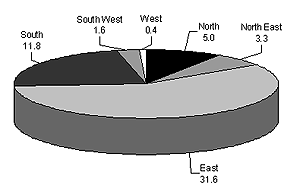
Source: BMI
However, these policies have not been very successful. In 2004, the latest year for which such data is available, the West attracted just US$2bn of the total US$60bn foreign direct investment (FDI) attracted to the country. Per-capita GDP, meanwhile, remains well under half that of the most prosperous regions, while well over half of the country's 100mn population who are still defined as poor come from the West. Finally, the West accounts for just over 2% of the country's total exports, despite the region's large endowment of natural resources.
However, this does not mean that the future is entirely bleak for the region, and retailers such as Carrefour are well aware of the potential that the West holds, particularly as the eastern parts of the country become more saturated. Altogether China's West accounts for one-quarter of the country's total population, and more than half its landmass.
Carrefour opened its first hypermarket in north-west China in 2004 in Xinjiang's capital Urumqi. A company representative explained that with a population of more than 2mn and significant recent local economic development, Urumqi offers a great market for retailers. This type of FDI is precisely what the Chinese government has been looking to promote. Therefore, Carrefour's moves West are likely to be mutually beneficial, both for the company and for the regional economy.
posted September 14, 2006 at 12:04 AM unofficial Xinjiang time | Comments (26)
September 13, 2006
Korla: Then and Now
 For most of the time since I started up this website nearly two years ago, there's been one man standing between me and the #1 Google link for "Korla Xinjiang". That man is Patrick Jennings, a Canadian photojournalist and travel writer who took one measly photo of Korla while biking across China in 1998 and posted it to his website. Google apparently puts a great deal of stock in the age of a link, so I've had to generate an awesome amount of Korla-related content in order to recently (and rightfully) gain the top spot.
For most of the time since I started up this website nearly two years ago, there's been one man standing between me and the #1 Google link for "Korla Xinjiang". That man is Patrick Jennings, a Canadian photojournalist and travel writer who took one measly photo of Korla while biking across China in 1998 and posted it to his website. Google apparently puts a great deal of stock in the age of a link, so I've had to generate an awesome amount of Korla-related content in order to recently (and rightfully) gain the top spot.
One thing that perplexed me for a long time, however, is trying to figure out from where Patrick's photo of Korla was taken. I finally saw a reference on his site to the Bayinguoleng Hotel (AKA Bazhou Binguan) and everything clicked. Thus, I went over to the hotel yesterday evening, managed to get access to the roof, and made an attempt at recreating the photo.
Patrick's photo was taken way back during the dark ages in September of 1998, looking east at sunrise from the Bazhou Binguan. My picture was taken yesterday at sunset, almost exactly eight year's later. Unfortunately, I'm too lazy to get up to capture the sunrise... and my photo was taken from a slightly higher elevation. The development of Korla is obvious in this photo, but not nearly as obvious as if the earlier photo had been taken looking towards the center of the city, rather than the outskirts:
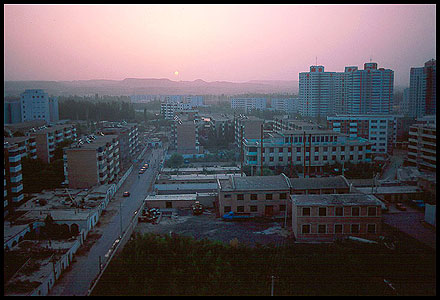
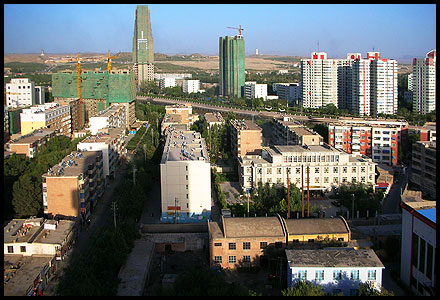
Mystery solved.
posted September 13, 2006 at 09:39 AM unofficial Xinjiang time | Comments (20)
September 12, 2006
Uyghur Folk Song: Nazirkum
In celebration of Rebiya Kadeer's Nobel Peace Prize nomination, I've decided to post this fairly ebullient Uyghur music video. The selection below is a modern update of a classic Uyghur folk song, Nazirkum. Of all the videos I've posted so far, this one probably shows the widest range of Uyghur dance moves. In fact, the actors in this video are so enthusiastic that they might even be accused of over-acting. Never mind that. As Kool and the Gang said, Celebrate good times, come on!
This clip can also be viewed at Google Video.
P.S. Can anyone figure out how to use the volume controls on the new YouTube player? I can only seem to mute, not adjust the volume.
posted September 12, 2006 at 09:04 AM unofficial Xinjiang time | Comments (20)
September 11, 2006
Kadeer Nominated for Nobel Prize
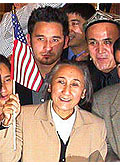 News via Reuters today that exiled Uyghur businesswoman Rebiya Kadeer, pictured at left, has been nominated for the Nobel Peace Prize this year. The prize will be announced on October 13th, and a win by Kadeer would propel Uyghurs into the international spotlight in a way that no advocacy or human rights group could ever hope to achieve. Since her expulsion from China in 2005, Kadeer has been an increasingly annoying thorn in the side of Chinese leaders, testifying before the U.S. Congress and becoming the de facto spokesperson for Uyghurs around the world.
News via Reuters today that exiled Uyghur businesswoman Rebiya Kadeer, pictured at left, has been nominated for the Nobel Peace Prize this year. The prize will be announced on October 13th, and a win by Kadeer would propel Uyghurs into the international spotlight in a way that no advocacy or human rights group could ever hope to achieve. Since her expulsion from China in 2005, Kadeer has been an increasingly annoying thorn in the side of Chinese leaders, testifying before the U.S. Congress and becoming the de facto spokesperson for Uyghurs around the world.
China counted on Rebiya Kadeer, a Muslim businesswoman-turned-activist, fading into political irrelevance like most exiled Chinese dissidents when she left for the United States last year. But it may have miscalculated.Kadeer, 58, an ethnic Uighur jailed for more than five years in China for providing state secrets to foreigners before her exile, won a Rafto Prize for human rights in Norway in 2004 and has been nominated for the Nobel Peace Prize this year.
"Rebiya Kadeer champions the rights of western China's Uighur ethnic group and is one of China's most prominent advocates of women's rights," Annelie Enochson, a Swedish parliamentarian, wrote in nominating Kadeer for the prestigious Nobel award.
The article goes on to compare Rebiya Kadeer with the Dalai Lama, a 1989 Nobel Peace Prize recipient.
Tibet's god-king, the Dalai Lama, won the Nobel prize in 1989, almost 40 years after Chinese troops marched into his homeland. He fled to India in 1959 after an abortive uprising against Chinese Communist rule.Kadeer, a one-time laundress, was little known outside China before her exile but a win would raise the profile of militant Uighurs' hitherto faceless movement to make the restive region of Xinjiang an independent state called East Turkestan.
The only thing I take issue with in the article is the wording potraying Kadeer as the face of a "militant Uighur" movement. She may be a strong advocate for independence, but I don't recall her ever voicing support for the violent uprisings that took place in Xinjiang almost a decade ago. You can read the whole article below.
Previous Kadeer-related entries on this blog are located here, here, and here.
EXCLUSIVE-China Muslim activist: from unknown to Nobel nominee
By Benjamin Kang Lim
11 September 2006
Reuters News
BEIJING, Sept 11 (Reuters) - China counted on Rebiya Kadeer, a Muslim businesswoman-turned-activist, fading into political irrelevance like most exiled Chinese dissidents when she left for the United States last year. But it may have miscalculated.
Kadeer, 58, an ethnic Uighur jailed for more than five years in China for providing state secrets to foreigners before her exile, won a Rafto Prize for human rights in Norway in 2004 and has been nominated for the Nobel Peace Prize this year.
"Rebiya Kadeer champions the rights of western China's Uighur ethnic group and is one of China's most prominent advocates of women's rights," Annelie Enochson, a Swedish parliamentarian, wrote in nominating Kadeer for the prestigious Nobel award.
"Kadeer has also used her resources as founder and director of a large trading company in northwestern China to provide fellow Uighurs with training and employment," Enochson wrote in the nomination, a copy of which was sent to Reuters by e-mail.
This year's winner is due to be announced in Oslo on Oct. 13. Kadeer is probably only one of many nominees as any member of parliament worldwide can put forward a name.
Four Rafto laureates have gone on to win the Nobel prize. Only 12 women have won since 1901, upsetting many feminists.
The director of the Norwegian Nobel Institute, Geir Lundestad, said in 2001 the committee should "sooner rather than later" speak out about the lack of democratic rights in China. He said China was the main exception to a global move to democracy.
ONE-TIME LAUNDRESS
Tibet's god-king, the Dalai Lama, won the Nobel prize in 1989, almost 40 years after Chinese troops marched into his homeland. He fled to India in 1959 after an abortive uprising against Chinese Communist rule.
Kadeer, a one-time laundress, was little known outside China before her exile but a win would raise the profile of militant Uighurs' hitherto faceless movement to make the restive region of Xinjiang an independent state called East Turkestan.
"Rebiya has undisputed legitimacy and the capacity of uniting Uighurs in exile," said Nicholas Bequelin, a China researcher in Hong Kong for the New York-based Human Rights Watch.
Kadeer, president of the Uighur American Association, is tipped to be elected president of the World Uighur Congress in October, a source close to her said.
Her biography in German, "A Woman's Struggle against the Dragon", will be published next year.
The Chinese Foreign Ministry had no immediate comment on the nomination but denounced Kadeer for "frequently engaging in anti-Chinese splittist activities".
"This kind of person is not qualified to represent Chinese Uighurs," the ministry spokesman's office said in a statement.
China keeps a tight grip on oil-rich Xinjiang, which shares borders with three former Soviet Central Asian republics, Afghanistan, Pakistan, Russia and Mongolia.
China calls Uighur militants terrorists and blames them for a string of bombings and assassinations in the 1990s.
But human rights groups say China has used its support for the U.S.-led war on terrorism to justify a wider crackdown on Uighurs, including arbitrary arrests, closed-door trials and use of the death penalty.
Kadeer was once a member of the top advisory body to China's parliament but fell from grace and was arrested in 1999 while on her way to meet U.S. congressmen visiting Xinjiang.
Her assets were worth 270 million yuan ($33.8 million) at the time of her arrest but her trading firm and other businesses in real estate are now almost bankrupt due to official harassment.
She said two of her sons were beaten up by Chinese police when they were detained in June and accused of tax evasion. The whereabouts of a third son who faces subversion charges are unknown and a daughter has been put under house arrest.
"Wang Lequan rushed to arrest my sons but Beijing may not rush to sentence them," Kadeer, a mother of 11, told Reuters by telephone from her office in Washington, referring to Xinjiang's Communist Party chief. She insisted her children were innocent.
Kadeer pledged to champion the rights of Uighur women and children at any cost, lamenting that many girls ended up working as prostitutes in Chinese cities and boys became thieves or pickpockets.
"I'm ready to pay the price," she said. "The more the Chinese government tries to destroy me, the more respect and influence I will have from my people." (Additional reporting by Alister Doyle in Oslo)
posted September 11, 2006 at 04:48 PM unofficial Xinjiang time | Comments (71)
September 06, 2006
Korla Fragrant Pears
Here in Korla, there's a noticeable buzz on the street every time fragrant pear (香梨) season rolls around. A good percentage of the local Uyghur population is involved in picking and packing the pears, with migrant workers pouring in from poorer areas in southern Xinjiang. Soon, the roads leading from the city will be clogged with trucks overloaded with freshly packed boxes, rushing the crispy fruit to wealthy consumers in Hong Kong and Japan. Mohammed - a Uyghur friend who's family owns quite a lot of fragrant pear trees - invited me out to his orchards near the Korla airport to take a look at the harvest. I brought my camera, of course:
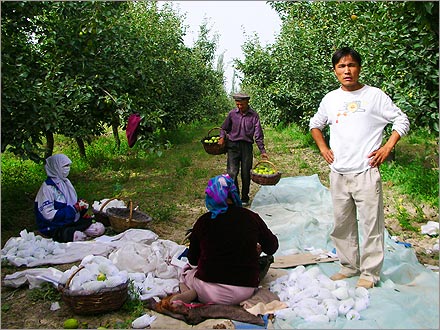

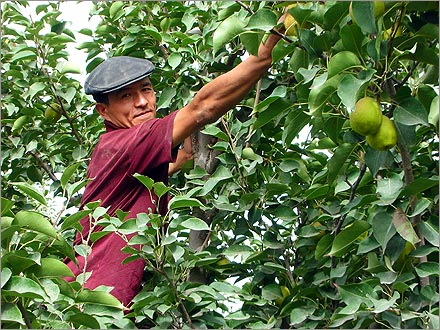
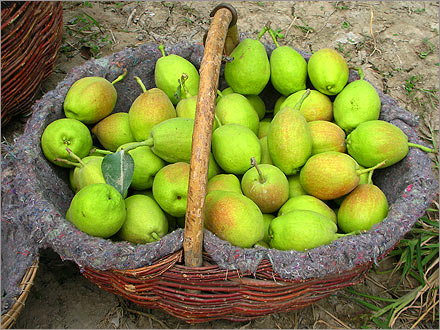
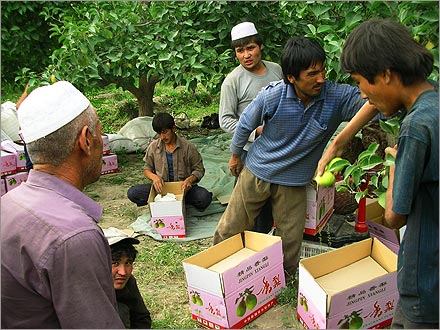
posted September 06, 2006 at 11:55 PM unofficial Xinjiang time | Comments (34)
September 05, 2006
"A Soul That Refuses to Go Away"
 Ta Kung Pao (大公报) is the PRC's official Communist Party mouthpiece in Hong Kong... so when the paper publishes a fiery anti-Uyghur separatist editorial, it's worth reading. Coming on the heels of last week's foiled "bomb plot", the diatribe may be a sign of more intense public security activities to come here in Xinjiang. The translated article reached me via the BBC Monitoring Service. Some interesting excerpts:
Ta Kung Pao (大公报) is the PRC's official Communist Party mouthpiece in Hong Kong... so when the paper publishes a fiery anti-Uyghur separatist editorial, it's worth reading. Coming on the heels of last week's foiled "bomb plot", the diatribe may be a sign of more intense public security activities to come here in Xinjiang. The translated article reached me via the BBC Monitoring Service. Some interesting excerpts:
In the past decades, although China has always cracked down on the East Turkestan separatist forces in a high-handed manner, East Turkestan is still like a soul that refuses to go away and continues to cause trouble. The reason for this is because in the process of fighting against the East Turkestan separatist forces, China has mainly taken "stopgap" measures with launching attacks on them as the dominant factor without taking measures to "eliminate the root causes" to remove this cancer.
[The] heresy of separatism is like an undercurrent flowing among some people in Xinjiang and its poisonous influence is far-reaching. As a matter of fact, it has been passed on from generation to generation among some people. If all-out efforts are not made to smash it, the "East Turkestan" forces will continue to rise one after another despite suppression. It is not right to say that the Chinese government has turned a blind eye and a deaf ear to the "East Turkestan" theories, but its efforts to root it out are obviously insufficient.
Yikes! You can read the full translation below.
Chinese government urged to deal harshly with Xinjiang separatism - paper
2 September 2006
BBC Monitoring Asia Pacific
Text of report by Yang Ching-lin headlined: "Eliminate root causes in combating terrorism: smash East Turkestan theories"; published by Hong Kong newspaper Ta Kung Pao website on 1 September
From 24 to 26 August, China and Kazakhstan held a joint antiterrorist exercise codenamed "Tianshan No 1 (2006)" and, on 28 August, the Xinjiang Public Security Department announced a region-wide checking of explosives in Xinjiang beginning that day, thus giving no opportunity for the "three forces" [forces of separatism, terrorism and extremism] to take advantage of the situation.
These moves by China to crack down on terrorists will make it more and more difficult for the "three forces" to conduct separatist and terrorist activities in Xinjiang.
However, it is also necessary to pay attention to the fact that in the past decades, although China has always cracked down on the East Turkestan separatist forces in a high-handed manner, East Turkestan is still like a soul that refuses to go away and continues to cause trouble. The reason for this is because in the process of fighting against the East Turkestan separatist forces, China has mainly taken "stopgap" measures with launching attacks on them as the dominant factor without taking measures to "eliminate the root causes" to remove this cancer.
The late modern Xinjiang history has proved that the root cause to the rampant "three forces" is the ideological system of "East Turkestan" national separatism. So long as this banner of a set of fabricated separatist ideology remains standing, the activities of the separatist forces will continue.
"East Turkestan" is a concept with political connotation created by the Western powers in pursuing the colonialist policy in Central Asia in the 19th century and they called the Hezhong (Samarkand) area of Central Asia swallowed up by Czarist Russia "West Turkestan" and the Tarim Basin in Xinjiang, China, "East Turkestan".
This is not a standard name but, in the early 20th century, the ideological trends of "Pan-Islamism" and "Pan-Turkism" infiltrated into Xinjiang. On the basis of what is said about opposing the colonial rule and striving for national independence in the ideological trends of "Pan-Islamism" and "Pan-Turkism", Xinjiang's separatist forces have regarded the Chinese Central Government and the Xinjiang local authorities as the colonial rule in Xinjiang and professed that Xinjiang should oppose China's colonial rule, strive for national unification and build an "East Turkestan Islamic" country.
Instigated by this ideological trend, the separatist forces set up the "East Turkestan Islamic Republic" in Kashi in 1933 that lasted only three months, and again set up the separatist political regime of the "East Turkestan Republic" in Ili in 1944 that lasted for one year and eight months.
In 1940, Mehmet Emin Bughra, one of the ringleaders of the separatist political regime "East Turkestan Islamic Republic", published abroad the book the "History of East Turkestan." This fabricated book says "East Turkestan" (Xinjiang) has been an independent country since ancient time and denies the historical fact that since the Han dynasty, Xinjiang has been under the jurisdiction of the emperor dynasties of China in the Central Plain. It has fabricated the story that the Second Turkish Khanate, an alliance of Turkic groups, which was established in 552 and fell in 744, was a nation that already existed 11,000 years ago (5,000 years earlier than Egypt).
This book has methodized, theorized and systemized the East Turkestan separatist ideology. It has become the "ideological and spiritual support" of the separatist forces and has been secretly spread in Xinjiang. In 1987, an enlarged edition of the book appeared in Ankara in Turkey, which has made the East Turkestan separatist ideological system even more "perfect".
Taking a panoramic view of the separatist activities conducted by the separatists in Xinjiang in the past decades, we shall find that they are guided without exception by the "East Turkestan" separatist theories.
This kind of heresy of separatism is like an undercurrent flowing among some people in Xinjiang and its poisonous influence is far-reaching. As a matter of fact, it has been passed on from generation to generation among some people. If all-out efforts are not made to smash it, the "East Turkestan" forces will continue to rise one after another despite suppression. It is not right to say that the Chinese government has turned a blind eye and a deaf ear to the "East Turkestan" theories, but its efforts to root it out are obviously insufficient. For example, theses that clarify matters and get to the bottom of things about the "East Turkestan" theories are rare; and in open propaganda, the "East Turkestan" theories are seldom refuted strongly on just grounds and usually only a general statement or denunciation is made. The government spokesman has frequently used the term "as is known to all", but as a matter of fact, most people are not clear about the history and origin of "East Turkestan".
Therefore, China should regard smashing the separatist ideological and theoretical system of "East Turkestan" as the most important task in cracking down on the conspiracy of the "three forces" of separating Xinjiang; and should inform countries with which it has established diplomatic relations about the criticism of this separatist ideological system and put it into the history textbooks in China. In this way, such separatist ideology will find no support among the people at home and abroad, and the conspiracy of the separatist forces will completely fall through.
posted September 05, 2006 at 12:34 AM unofficial Xinjiang time | Comments (23)
September 04, 2006
International Flights to Xinjiang
 I've just returned from a week in Urumqi, during which I hobnobbed with Central Asian big shots at the international trade fair and spent significant sums of cash at the Fubar. I returned to Korla last night, heavily laden with Y200 worth of cheese from Carrefour and a very bad cold. My business partner, David, has gone off to Bishkek, Kyrgyzstan in order to renew his Chinese visa... although I hear he's having trouble, so there's no telling when he'll be coming back. Something about troublesome new visa regulations for foreigners in Xinjiang.
I've just returned from a week in Urumqi, during which I hobnobbed with Central Asian big shots at the international trade fair and spent significant sums of cash at the Fubar. I returned to Korla last night, heavily laden with Y200 worth of cheese from Carrefour and a very bad cold. My business partner, David, has gone off to Bishkek, Kyrgyzstan in order to renew his Chinese visa... although I hear he's having trouble, so there's no telling when he'll be coming back. Something about troublesome new visa regulations for foreigners in Xinjiang.
Anyway, all of those Central Asian businessmen at the trade fair got me thinking... to/from which international cities can one fly to/from Urumqi here in Xinjiang? I'm making a list below of every international flight destination of which I'm aware. Please feel free to add cities or make corrections in the comments section below:
• Almaty, Kazakhstan °
• Astana, Kazakhstan °
• Bishkek, Kyrgyzstan °
• Osh, Kyrgyzstan °
• Dushanbe, Tajikistan
• Tashkent, Uzbekistan
• Kabul, Afghanistan
• Islamabad, Pakistan
• Novosibirsk, Russia
• Moscow, Russia
• Baku, Azerbaijan
°Kazakh and Kyrgyz visas can be obtained in Urumqi. The Kazakh Consular Office is located off of Beijing Lu in north Urumqi. The Kyrgyz Consular Office is located in the Yazhong Hotel, near Hualing Wholesale Market.
In other regional transportation news, a CAREC-sponsored highway linking Xinjiang with Kyrgyzstan and Uzbekistan is supposed to begin service by the end of 2008:
With a total length of 937 kilometers, the China-Kirgizstan-Uzbekistan highway starts from Kashi (Kaxgar) in Xinjiang Uygur Autonomous Region, northwest China, and extends through Kirgizstan to Tashkent, Uzbekistan.
Highway linking China, Kirgizstan, Uzbekistan expected to be in service in 2008
4 September 2006
Xinhua's China Economic Information Service
BEIJING, September 4 (CEIS)-- A central Asia highway corridor linking China, Kirgizstan and Uzbekistan is expected to in service by the end of 2008, said an official from the Chinese Ministry of Finance on September 1.
Ju Kuilin, deputy-director of the International Department of the Ministry of Finance, said the highway's China section has been finished, with the other sections outside China progressing smoothly.
According to Ju, the highway is an important part of economic cooperation under the framework of Central Asia Regional Economic Cooperation (CAREC), which has attracted financial support from international financial agencies including the Asian Development Bank (ADB).
Ju said he was "very optimistic" about the future of the highway, which will become a new silk road linking China with central Asia.
According to Ju, the Chinese government has invested 60 million yuan (7.5 million U.S. dollars) in the Kirgizstan construction of the highway, and the 17-kilometer section within Kirgizstan built by China has also been finished.
With a total length of 937 kilometers, the China-Kirgizstan- Uzbekistan highway starts from Kashi (Kaxgar) in Xinjiang Uygur Autonomous Region, northwest China, and extends through Kirgizstan to Tashkent, Uzbekistan.
Currently, member countries of CAREC, including Afghanistan, Azerbaijan, Kazakhstan, Kyrgyzstan, Mongolia, Tajikistan, Uzbekistan and China are working together to establish a regional transport network.
Besides the highway corridor project linking China, Kyrgyzstan and Uzbekistan, plans for other highway and railway projects linking China with some of the central Asian countries have also been proposed, said Ju.
posted September 04, 2006 at 03:14 PM unofficial Xinjiang time | Comments (45)
